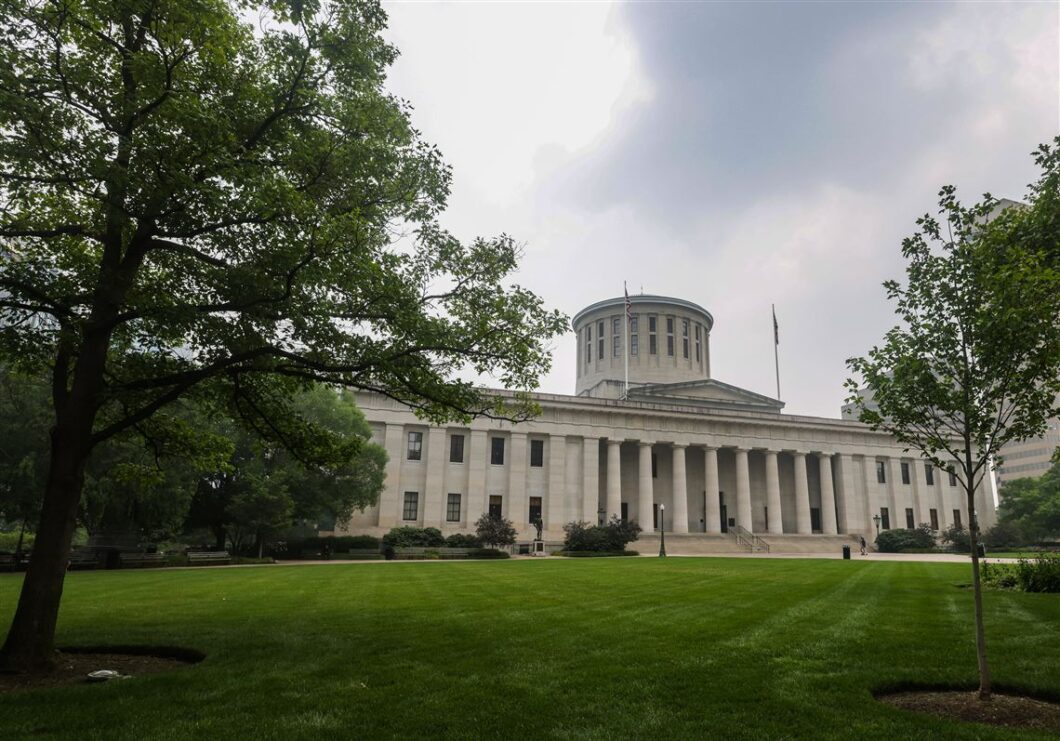Black former state lawmakers from Ohio and Michigan on Monday broke with Democrats in general and the NAACP by arguing that a proposed constitutional amendment to overhaul redistricting will lead to fewer minorities in office.
They also claimed that approval of Issue 1 would put the map-making pen in the hands of an inexperienced citizens panel that would be unaccountable to voters.
Both arguments mirror those made by Republicans seeking to convince voters to reject the ballot issue.
“It doesn’t make any sense that someone would turn over their rights to absolute novices under the guise of proportionality,” said Sherry J. Gay-Dagnogo, a former Michigan state representative now serving on the Detroit School Board.
“All the while, those three Black congressional seats that you so enjoy here? You won’t have them …,” she said. “They cut Detroit up into 22 pieces. … You don’t want to have to go through the same fight that we went through.”
She was referring to the Voters Not Politicians amendment approved by Michigan in 2016 that introduced a citizens commission to redraw maps in that state.
Ohio’s Issue 1 will ask voters on Nov. 5 to replace separate processes for redrawing congressional and state legislative districts with a single 15-member commission on which no “politician” — elected official, close family member, staffer, lobbyist, or major campaign donor — may serve. Membership would be equally divided between Republicans, Democrats, and independents.
“In the city of Detroit, the state of Michigan, we don’t have a Black congressperson — in the Democratic caucus that is,” Ms. Gay-Dagnogo said. “We have had a congressperson for more than 60-plus years, and now to be left with no congressional Black representation is absolutely wrong.”
The sole Black congressman in Michigan is a Republican — U.S. Rep. John James in suburban Detroit’s 10th District.
Ohio’s new redistricting process must, first and foremost, comply with federal and voting rights laws.
Issue 1 spells out how the commissioners would be selected as well as the retired judges who would select those commissioners. It requires any challenge to the end result to be filed with the Ohio Supreme Court, but Ms. Gay-Dagnogo argued that average citizens would not be able to afford to do so.
“This is a scheme that is designed to undermine democracy under the guise of reform of gerrymandering,” said former Rep. John Barnes, a Cleveland Democrat who helped to create the Black Equity and Redistricting Fund Inc.
“This is likened to individual vigilantism …” he said. “It’s a process of people who are trying to hijack the Ohio voter system for an obvious outcome that is inconsistent with democracy and opportunities for us to build a better tomorrow.”
He was joined by former Rep. Bernadine Kennedy Kent of Columbus.
“The politicians are so desperate to stop Issue 1 that they are bringing in politicians from Michigan to lie about it,” said Chris Davey, spokesman for Citizens Not Politicians.
Tom Roberts, president of the Ohio Conference of Branches of the NAACP, said he has never heard of the Black Equity and Redistricting Fund.
“Gerrymandering for generations has harmed Black communities and Black people in Ohio, and Issue 1 will finally put an end to this scourge on our system of representative government,” he said.
“What could be more unaccountable than the politicians seven times imposing unconstitutional, gerrymandered maps on Ohio voters that are designed to dilute and divide Black communities?” he said. “What could be more unaccountable than being one of the 10 most gerrymandered states in the nation?”
In related action Monday, Ohio Supreme Court Justice Jennifer Brunner rejected a request from Attorney General Dave Yost’s office that she recuse herself from a pending challenge to the language on Issue 1 that would greet voters in the polling booth on Nov. 5 and on absentee ballots.
Mr. Yost’s office on Friday pointed to a federal lawsuit she filed against Secretary of State Frank LaRose, a defendant in the redistricting case. That federal case challenges a state law mandating that partisan affiliations of candidates in justice and appellate judge races appear on ballots.
“Because Justice Brunner chose to sue the Ohio Secretary of State in her own separate action, her impartiality to decide the claims against the Secretary of State in this proceeding might reasonably be questioned,” Mr. Yost’s office wrote.
Justice Brunner, a Democrat, countered that the request for her recusal contradicts “General Yost’s arguments that the actions of the Ohio Ballot Board are not the actions of individual members, but instead are the collective actions of its members.”
The attorney general has made that argument to thwart efforts by the two Democratic negative votes on the ballot board — state Sen. Paula Hicks-Hudson of Toledo and Rep. Terrence Upchurch of Cleveland — to distance themselves from the arguments being made in the court on behalf of the board’s 3-2 majority. Both Ms. Hicks-Hudson and Mr. Upchurch are Black and support the amendment.
The challenge claims the ballot language, adopted by a 3-2 party-line vote of the ballot board, deliberately misrepresents the proposed amendment to encourage “no” votes at the polls.

